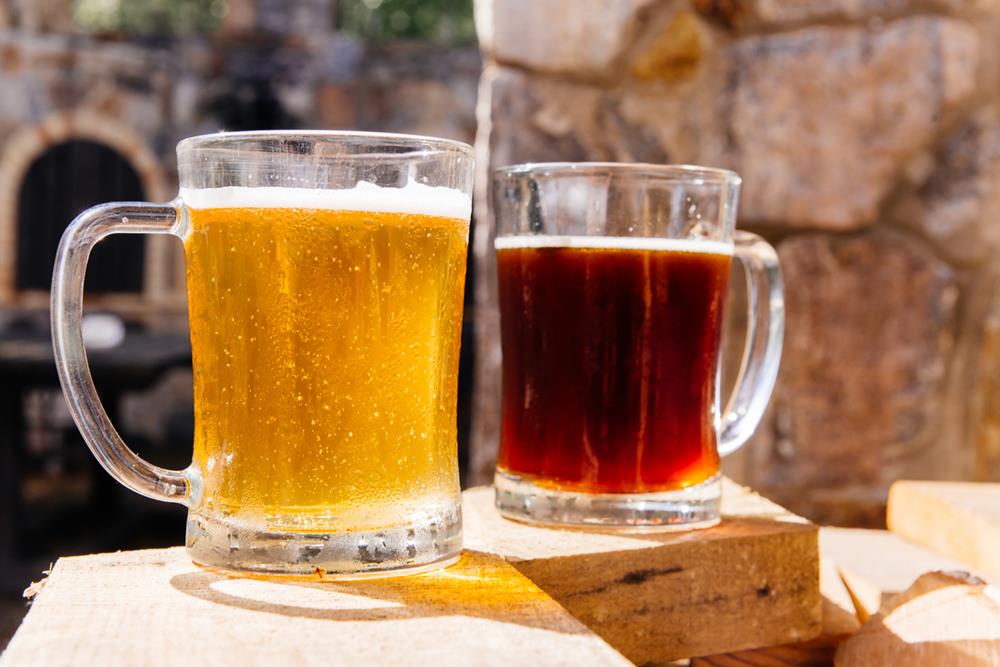Have you ever thought about how beer isn’t just something people drink for fun? It’s actually a really old drink that has popped up in stories and legends from all around the world. When we dive into books and myths from different places, we find that beer has been a big deal for a very long time. It wasn’t just about having a good time; it was also about friendship, celebrations, and even praying to the gods.
In this article, we’re going to take a look at how beer has shown up in tales and myths from various cultures. We’ll see that, whether it’s in a story from a long time ago or something a bit more modern, beer often means more than we might think. It’s all about how people come together, celebrate, and make sense of the world around them. Let’s find out how beer has made its mark in stories and legends from different corners of the globe!
The Ancient Origins of Beer
Beer’s Beginnings
Long before we had cafes and bars, people were already enjoying beer. This drink is one of the oldest that humans have made, dating back thousands of years. Imagine ancient people, just like us, sitting around and sharing stories, but with a jug of beer made from wild grains. Scientists have found recipes for beer on clay tablets and in tombs, showing us that brewing beer was a big deal even in ancient times.
Beer in Ancient Civilizations
In places like ancient Sumer (modern-day Iraq) and Egypt, beer wasn’t just a casual drink; it was part of their daily lives. The Sumerians even had a goddess of beer, Ninkasi, showing how important it was to them. They believed beer was a gift from the gods, helping people relax and connect with each other. In Egypt, beer was so important that it was used as a kind of money and offered to the gods in prayers for a good afterlife.
Sacred Brews and Social Bonds
What’s fascinating is that beer wasn’t just about getting drunk. In many ancient societies, brewing and drinking beer was a sacred act. It was a way to bring people together, celebrate important events, and honor the gods. During feasts and celebrations, beer was often the star of the show, helping to strengthen bonds within the community. This tradition of beer as a social drink is something that has lasted through the ages, showing us that some things never change.
Beer’s Role in Rituals and Daily Life
Imagine a world where beer is part of your job payment or where you need to brew a good batch to please the gods. That was the reality for many in the ancient world. Workers in the pyramids of Egypt were paid in beer, and in many cultures, brewing was a respected skill, often done by women. Beer was more than just a drink; it was a part of everyday life, from the highest temples to the humblest homes.
The story of beer is a journey through time, showing us how this ancient beverage has been a companion to humanity through thick and thin. From sacred rituals to a pint with friends, beer’s origins remind us of its enduring place in human history.
Beer in Mythology and Folklore
In the world of mythology and folklore, beer often holds a place of honor, celebrated as a divine gift or a cherished secret of the gods. From the halls of Valhalla to the villages of Africa, beer weaves its way through stories of creation, quests, and divine celebrations.
Beer in Norse Mythology
Norse Mythology introduces us to the Mead of Poetry, a mythical beer that grants anyone who drinks it the ability to recite poetry and wisdom. This mead was made from the blood of Kvasir, the wisest of beings, and became a coveted treasure among gods and mortals alike. The story encapsulates the belief that beer could bestow not just joy but also enlightenment and artistic inspiration.
Beer and Celtic Festivities
In Celtic tales, beer symbolizes hospitality and abundance. Legends tell of magical cauldrons that could brew endless amounts of beer, ensuring that no guest would ever go thirsty. These stories highlight the social aspect of beer, emphasizing its role in fostering community and celebration during feasts and seasonal festivals.
Beer and African Traditions
African myths often center around beer as a catalyst for unity and communication with the spiritual realm. In many tribes, beer is brewed for ceremonies to honor ancestors, mark the harvest, and celebrate marriages. These traditions underscore beer’s significance in not only social but also spiritual contexts, acting as a bridge between the living and the deceased.
Beer in Ancient Egypt – A Drink for the Afterlife
Moving to Ancient Egypt, beer was not only a staple of daily life but also played a role in the afterlife. Egyptians included beer in burial offerings, believing it would sustain the dead in their journey to the afterlife. This practice illustrates the deep cultural significance of beer, viewed not just as a beverage but as an essential companion for both the living and the dead.
The stories and myths that surround beer highlight its integral role in human culture, serving as a testament to its enduring legacy. Whether as the drink of the gods or the centerpiece of community gatherings, beer’s presence in mythology and folklore reflects its profound impact on human civilization.
Beer in Literature
The presence of beer in literature spans centuries, mirroring its evolution from a basic sustenance to a complex symbol of culture, class, and community. As we explore its literary journey, we find that beer often serves as more than a backdrop; it becomes a character in its own right, shaping narratives and revealing deeper truths about society and human nature.
Medieval Tales
Chaucer’s “The Canterbury Tales” is an early example, where beer not only quenches thirst but also offers insights into the social dynamics of the time. The pilgrimage provides a cross-section of medieval society, with taverns and alehouses serving as crucial gathering spaces where stories flow as freely as beer. These settings highlight the communal aspect of beer, underscoring its role in social interaction and storytelling.
Shakespeare’s Bubbling Pots of Character
In the works of Shakespeare, beer subtly influences the setting and characters. From the rustic alehouses of “Henry IV” to the merry scenes in “Twelfth Night,” beer helps to define social standing, character, and mood. Shakespeare’s nuanced portrayal of beer and alehouses reflects their importance in Elizabethan society as centers of communal life and gossip.
Modern Reflections – Complexity in a Glass
Moving to more modern narratives, authors like James Joyce and Ernest Hemingway have used beer to explore themes of disillusionment, camaraderie, and the human condition. In Joyce’s “Ulysses,” the pub scenes serve as critical junctures for introspection and interaction, showcasing beer’s ability to both isolate and unite individuals. Hemingway’s sparse style captures the essence of beer as a simple pleasure in an otherwise complex world, often highlighting the solace it offers amidst the chaos.
Beer as a Symbol of Common Humanity
Contemporary literature continues to embrace beer, using it to navigate the complexities of identity, belonging, and cultural change. In novels and short stories, beer often symbolizes a shared human experience, transcending cultural and temporal boundaries to connect characters and readers alike.
The Craft of Brewing in Literary Form
The craft beer movement has also found its way into literature, with stories that delve into the artistry and passion behind brewing. These narratives parallel the creative process of writing itself, suggesting that both brewing and storytelling are forms of craftsmanship that require patience, skill, and a touch of magic.
In the realm of literature, beer acts as a versatile symbol, reflecting the nuances of human experience across ages and cultures. Its presence in literary works underscores the beverage’s enduring relevance in society—not merely as a source of sustenance or pleasure but as a vessel for exploring the depths of human nature and the intricacies of social interaction. Through the lens of literature, beer becomes a mirror, reflecting the joys, sorrows, and complexities of the human condition.
Symbolism and Metaphor
The role of beer in stories, myths, and literature often transcends the physical realm, venturing into the rich territory of symbolism and metaphor. This humble beverage, brewed from the earth’s grains, carries with it layers of meaning that illuminate various aspects of life, culture, and the human experience.
- Community and Connection: At its frothiest core, beer symbolizes community and social bonding. The act of sharing a beer has universally signified the coming together of people, whether in celebration, sorrow, or simply the daily ebb and flow of life. This communal aspect is deeply embedded in human culture, reminding us of our inherent desire for connection and belonging.
- Abundance and Fertility: Beer is also deeply rooted in symbols of abundance and fertility. Its primary ingredients, grain, and water, are essential to life and growth, echoing the cycles of nature. In many cultures, beer is celebrated in harvest festivals and rituals as a gift from the earth, symbolizing the fruition of hard work and the bounty of the land.
- Transformation and Renewal: The brewing process itself—a transformation from grain to golden liquid—serves as a powerful metaphor for transformation and renewal. This change mirrors life’s constant flux and the idea that from simple beginnings, complexity and richness can emerge. It speaks to the human capacity for change and the possibility of alchemy in our lives, turning the mundane into something extraordinary.
- The Elixir of Wisdom and Enlightenment: In mythology and folklore, beer often appears as an elixir of wisdom and enlightenment, a theme seen in the Norse Mead of Poetry. This symbolism suggests that beer, and by extension knowledge, is something to be sought after, a reward for those who dare to explore the unknown or challenge the status quo.
- Beer as a Mirror of Society: Beer can also act as a mirror reflecting societal values and changes. In literature and historical narratives, the way characters interact with beer and the contexts in which they drink it reveal insights into social hierarchies, cultural norms, and even economic conditions. This mirroring effect allows authors and storytellers to comment on their world, using beer as a lens through which readers can explore deeper societal truths.
Through its symbolic and metaphorical roles, beer becomes more than just a beverage; it is a vessel filled with meaning and significance. It touches on universal themes of life, transformation, and community, offering a rich palette for exploration in stories, myths, and literature. The symbolism and metaphors associated with beer invite us to look beyond the surface, to see in a pint glass a reflection of ourselves and our societies, distilled through the ages.
Cultural Significance Across the Globe
Beer’s journey through human history is as diverse as it is long, touching every corner of the world and infusing itself into the fabric of many cultures. This global beverage has been adapted, celebrated, and revered in various forms, reflecting the unique character and traditions of each society it encounters.
- Hospitality and Celebration: Across cultures, beer often stands as a universal language of hospitality and celebration. From the communal beer halls of Germany to the traditional beer-sharing ceremonies in Africa, it plays a pivotal role in welcoming guests and cementing social bonds. These practices highlight a global understanding of beer as a catalyst for friendship and unity.
- Spiritual Significance: In many ancient civilizations, beer was more than just a drink; it was a sacred offering to the gods. The ancient Egyptians, for instance, offered beer to their deities in the belief that it would secure a favorable passage to the afterlife. This spiritual significance underscores the profound respect and reverence for beer within these cultures, acknowledging its divine origins.
- Cultural Identity and Tradition: Beer often reflects the tastes, resources, and traditions of the place where it’s made, becoming a part of the cultural identity. Belgian Trappist beers, for example, are not only renowned for their quality but also for their deep-rooted connection to the monastic communities that brew them. Similarly, the craft beer movement in the United States has sparked a renaissance of brewing, emphasizing local ingredients and innovative techniques that reflect a new chapter in American brewing.
- Festivals and Social Gatherings: Beer festivals, such as Oktoberfest in Germany, showcase the beverage’s ability to bring people together in celebration. These events, rich in tradition and joy, highlight the communal spirit of beer, drawing participants from all walks of life to share in the convivial atmosphere. Beyond mere gatherings, these festivals often serve as a testament to beer’s cultural significance, weaving together history, tradition, and community.
- Artisanal Brewing and Economic Influence: The global craft beer movement has highlighted the economic and artisanal impact of beer, with small breweries popping up in cities and towns around the world. These brewers are not only revitalizing local economies but also reinvigorating beer’s cultural role by experimenting with local flavors and brewing traditions, thus contributing to a global tapestry of beer culture.
The cultural significance of beer spans the globe, embodying a myriad of meanings and traditions. From ancient rituals to modern craft breweries, beer continues to play a central role in social gatherings, religious ceremonies, and cultural identities. Its universal appeal lies in its ability to adapt and resonate with people across different cultures, making it not just a beverage but a significant cultural artifact.
Conclusion
Throughout history and across cultures, beer has been a symbol of friendship, a part of important rituals, and a way to bring people together. From ancient myths to modern festivals, beer has always had a special place in stories and celebrations. It shows us how, no matter where we’re from, we can find common ground and joy in the simple act of sharing a brew. So, the next time you enjoy a beer, remember you are part of a long tradition that spans the globe and connects us all.






